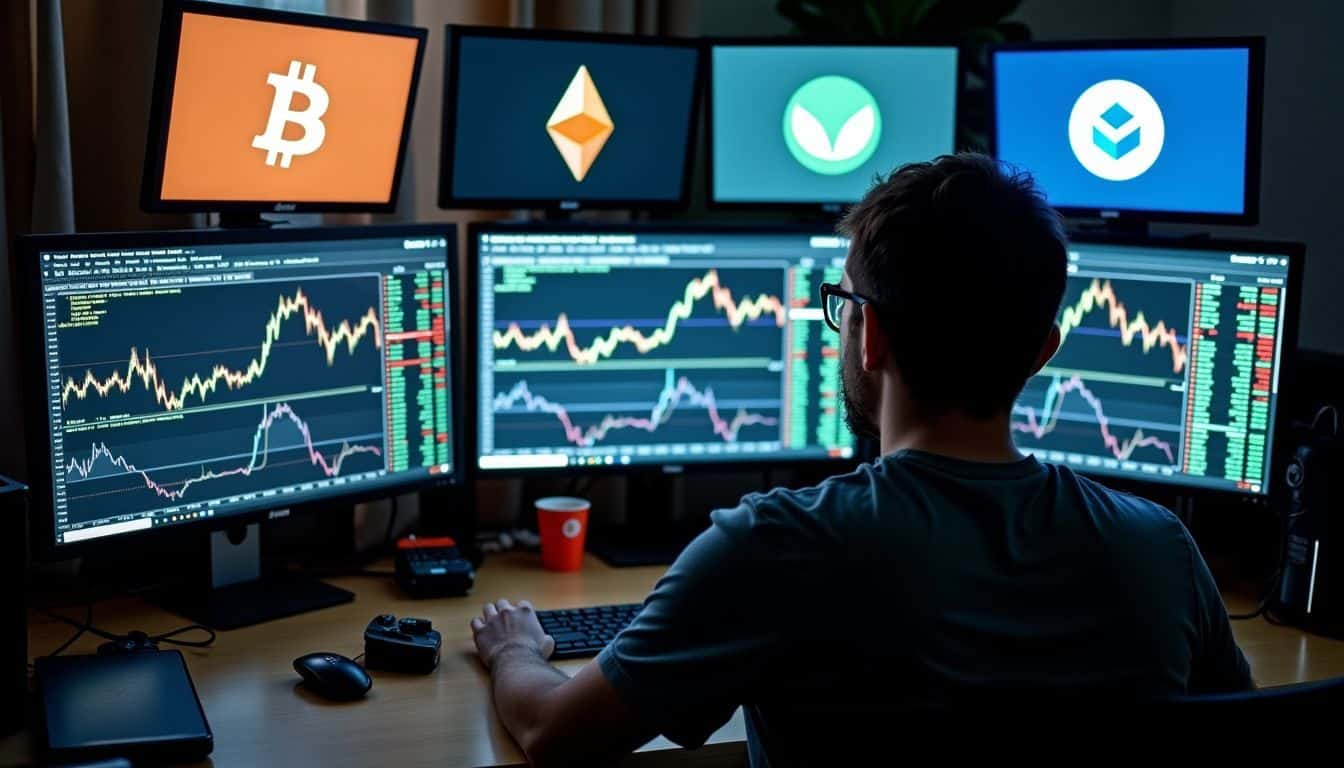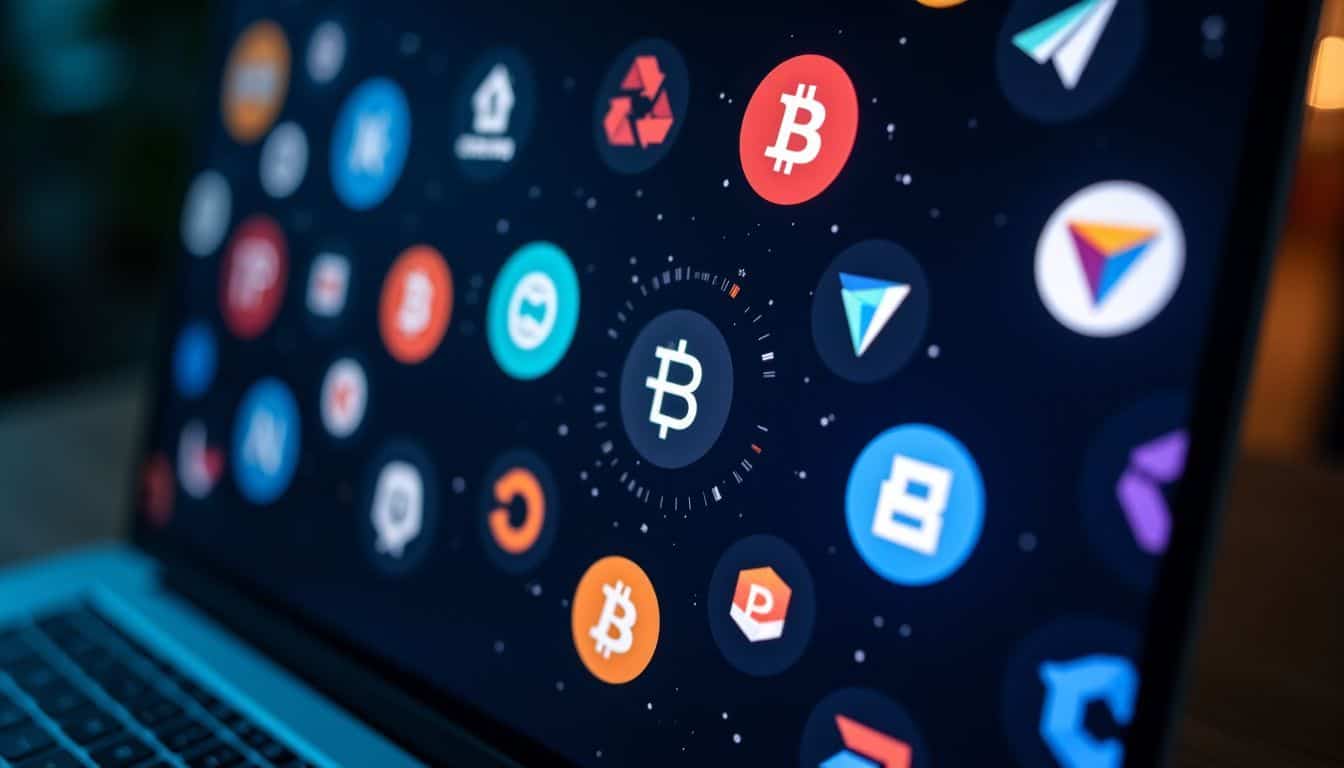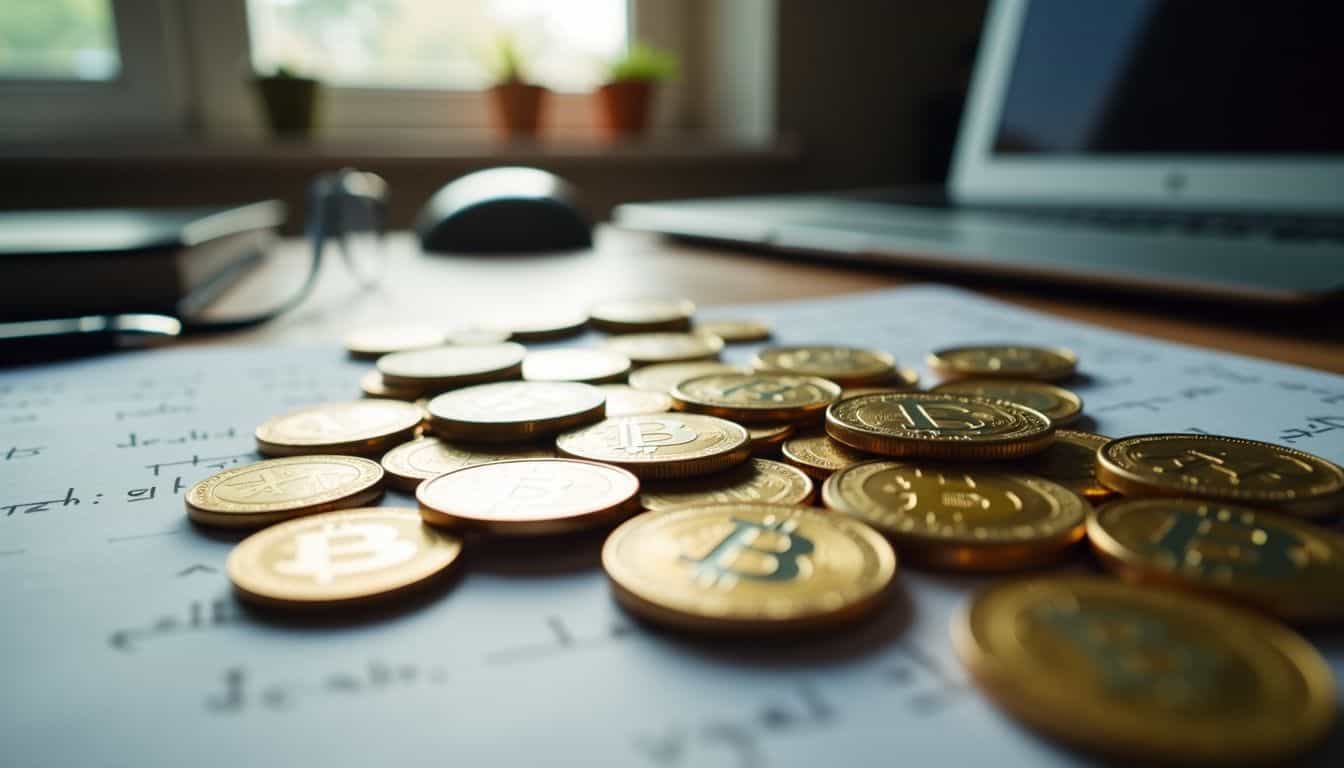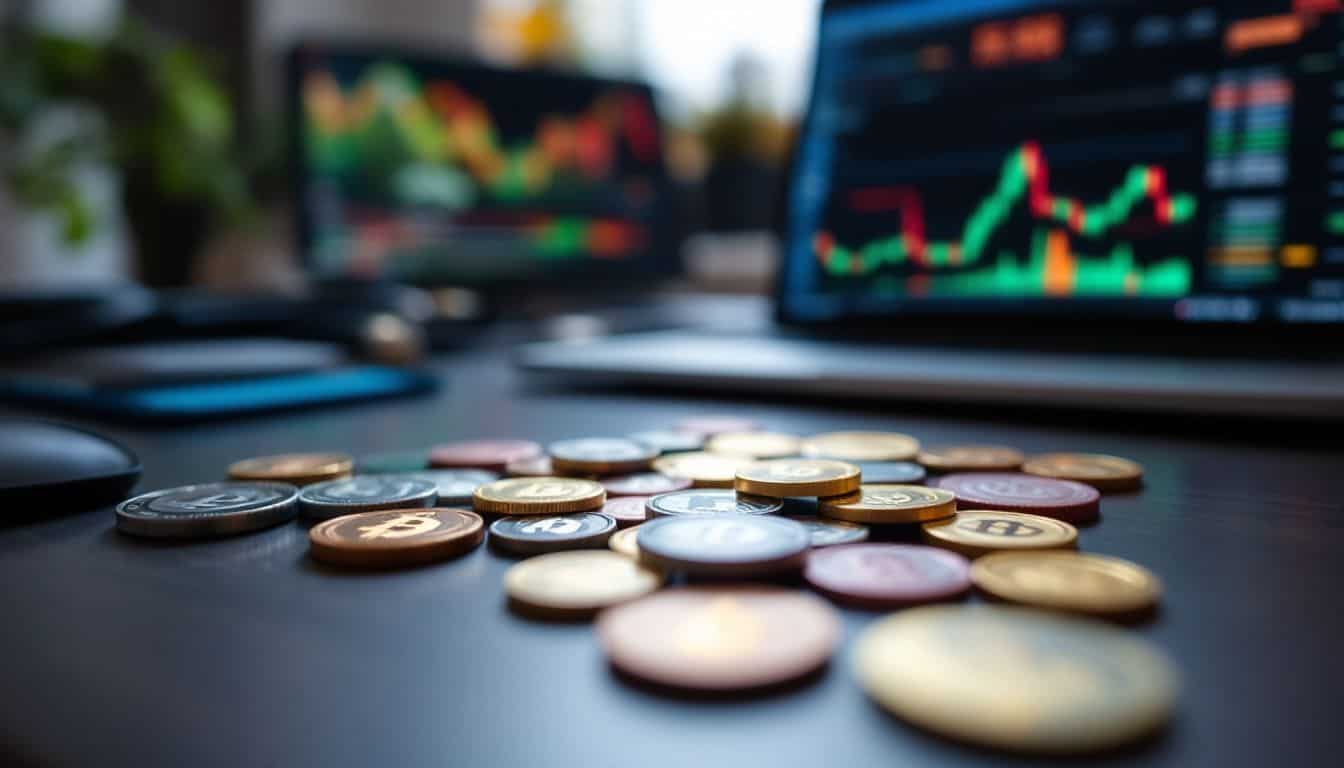Feeling unsure about altcoins in crypto? You’re in good company. Altcoins account for more than 40% of the total crypto market cap. This article will break down what altcoins are and explore six types that might improve your portfolio.
Ready to explore altcoin investing? Let’s get started!
Key Takeaways
Altcoins make up over 40% of the total crypto market cap and come in many types like payment tokens, stablecoins, security tokens, utility tokens, governance tokens, and meme coins.
Stablecoins like Tether (USDT) and USD Coin (USDC) aim to maintain steady value by being tied to real-world assets. Visa announced in March 2021 that it would start using USDC for some transactions.
Security tokens represent ownership in real-world assets, like stocks or bonds. In 2021, Exodus turned $75 million worth of shares into tokens on the Algorand blockchain in the first SEC-approved Reg A+ token offering.
Altcoins offer high growth potential and diversification but come with risks like high volatility, limited liquidity, and potential scams. Experts predict only a few strong altcoins with real-world uses will survive long-term.
To get started with altcoins, research projects thoroughly, consider using established crypto exchanges or decentralized exchanges (DEXs), and securely store coins using hardware wallets for large amounts and software wallets for day-to-day use.
Table of Contents
Understanding Altcoins

Altcoins are the cool kids on the crypto block. They’re not Bitcoin, but they’re shaking things up in their own way – from payment solutions to digital collectibles.
Distinction from Bitcoin

Bitcoin stands tall as the first and most famous crypto. But altcoins? They’re the rebels of the digital money world. These coins offer different features, tech, and goals than Bitcoin.
Some aim to be faster or cheaper to use. Others focus on privacy or smart contracts. Each altcoin carves its own path, trying to solve problems Bitcoin can’t or won’t tackle.
Litecoin, born in 2011, was the first to challenge Bitcoin’s throne. It uses a different mining method called Scrypt, making it easier for regular folks to mine. Since then, thousands of altcoins have popped up.
Some are Bitcoin forks – tweaked versions of the original code. Others, like Ethereum, built entirely new systems. This variety gives investors more options to spread their bets and potentially boost returns.
Varieties of Altcoins

Let’s explore the varied landscape of altcoins. These digital currencies come in many forms, each with distinct features and uses.
- Payment Tokens: These altcoins aim to be digital cash – fast and cheap to send. Think Litecoin and Ripple’s XRP.
- Stablecoins: Tied to real-world assets, these coins maintain steady value. Tether (USDT) and USD Coin (USDC) are key players here.
- Security Tokens: Representing ownership in real-world assets, they’re like digital stocks or bonds. Many see them as finance’s future.
- Utility Tokens: Used within specific platforms, these coins have particular functions. Ethereum’s ETH powers smart contracts and apps on its network.
- Governance Tokens: They give holders voting rights in decentralized systems. MakerDAO’s MKR token is a good example.
- Meme Coins: Originating from internet jokes, these can gain huge followings. Dogecoin and Shiba Inu fall into this group.
Each type serves different purposes in the crypto ecosystem. As a tech enthusiast, you might find utility tokens most intriguing for their potential. Or perhaps you’re interested in the financial aspects of security tokens. Whatever catches your eye, there’s likely an altcoin that suits you. Just be sure to research thoroughly before investing. A good crypto trading platform can help you explore these options safely.
Exploring Altcoin Categories

Altcoins come in many flavors – each with its own special sauce. Let’s dive into six types that could spice up your crypto portfolio… and maybe even fatten your wallet.
Payment Tokens

Payment tokens are the bread and butter of the crypto world. They’re digital coins you can use to buy stuff or swap for other cryptos. Think of them as the cash of the blockchain – easy to send, quick to receive.
Bitcoin, the big daddy of crypto, falls into this group. But it’s not alone. Litecoin, Dash, and Monero are also part of this digital money club.
These tokens aim to make transactions smoother than a fresh jar of Skippy. They often boast faster speeds and lower fees than traditional money transfers. Some even offer extra perks like privacy features.
As one crypto expert puts it:
Payment tokens are reshaping how we think about money. They’re not just digital – they’re borderless, instant, and in many cases, more secure than what we’ve used before.
Stablecoins

Moving from payment tokens, let’s dive into stablecoins – the steady Eddies of crypto. These coins aim to keep their cool when other cryptos go wild. They’re pegged to stuff like the U.S. dollar or gold, which helps them stay…
well, stable. Take Tether (USDT) or USD Coin (USDC) for example. They’re like the chill friends at a crazy party.
Here’s a fun fact: Visa’s got its eye on stablecoins, too. In March 2021, they said they’d start using USDC for some transactions. That’s pretty big news! It shows that even the big players are starting to see stablecoins as legit.
Plus, these coins can help smooth out the bumps in your crypto portfolio. It’s like having a safety net when you’re walking the crypto tightrope. As the future is crypto, stablecoins might just be your best bet for a less nerve-wracking ride.
Security Tokens

Unlike stablecoins, security tokens pack a different punch. They’re digital assets that stand for real-world value – think stocks, bonds, or even real estate. But here’s the kicker: these tokens play by the rules.
The SEC keeps a close eye on them, making sure everything’s above board. It’s like having a digital stock certificate, but cooler.
Security tokens are shaking things up in the crypto world. Take Exodus, for example. In 2021, they pulled off a neat trick. They turned $75 million worth of shares into tokens on the Algorand blockchain.
It was the first SEC-approved Reg A+ token offering. That’s a big deal! It shows how these tokens are bridging the gap between traditional finance and the wild west of crypto. Pretty exciting stuff for us geeks, right?
Utility Tokens

Moving from security tokens, let’s talk about utility tokens. These digital assets are like Swiss Army knives in the crypto world. They’re not just for show – they do real work within their networks.
Utility tokens power specific ecosystems. Take Filecoin, for example. It’s used to buy and sell storage space on a decentralized network. Then there’s Ether (ETH), the fuel that runs Ethereum’s engine.
These tokens aren’t trying to be money. They’re tools with jobs to do. But here’s a wild ride – USTerra. It tried to stay pegged to the dollar by minting and burning tokens. On May 11, 2022, it crashed hard.
Ouch! That’s the risk with utility tokens. They can be super useful… or super volatile.
Utility tokens are the workhorses of the blockchain world – they get things done.
Governance Tokens
Governance tokens are the cool kids on the blockchain block. They give you a say in how things run. Imagine having a voice in a digital club… that’s what these tokens do! With them, you can vote on big decisions, like changing rules or spending money.
It’s like being part of a secret society, but way more techy.
Take Maker (MKR) for example. It’s the big cheese in the MakerDAO world. If you’ve got MKR, you’re not just along for the ride – you’re in the driver’s seat. You get to vote on important stuff that affects the whole system.
It’s pretty neat… you’re not just using crypto, you’re shaping its future!
Meme Coins
Moving from governance tokens, let’s talk about meme coins. These digital assets are the class clowns of crypto – born from internet jokes and viral trends, they’ve taken the market by storm.
Dogecoin (DOGE) and Shiba Inu (SHIB) are at the front, riding waves of social media hype. Unlike their serious cousins, these coins don’t try to solve big problems. They’re all about fun, community, and sometimes…
making a quick buck.
But don’t be fooled by their silly names. Meme coins can pack a punch in your portfolio. They often see huge price swings, driven by tweets from big names or Reddit rallies. It’s a high-risk, high-reward game.
Some folks have struck it rich, while others got burned. If you’re thinking of jumping in, do your research and only play with money you can afford to lose. After all, with meme coins, today’s joke could be tomorrow’s jackpot… or junk.
Comparing Altcoins and Bitcoin

Bitcoin’s the big dog, but altcoins are nipping at its heels. They’re shaking things up with fresh tech and new ways to use crypto – it’s like comparing a flip phone to a smartphone.
Technological Distinctions
Altcoins often pack a tech punch that sets them apart from Bitcoin. Take Ethereum, for instance. It’s not just a digital coin – it’s a whole platform for building apps. Cool, right? This means developers can create all sorts of nifty things on top of it.
Other altcoins might focus on speed, privacy, or energy efficiency. Litecoin, the OG altcoin from 2011, aimed to be faster than Bitcoin. It’s like Bitcoin’s speedy little brother.
Some altcoins use totally different ways to verify transactions. While Bitcoin uses a lot of computer power, others might use different methods. These could save energy or make things quicker.
It’s like comparing a gas-guzzling truck to a sleek electric car. Both get you there, but in very different ways. The tech behind altcoins is always changing, trying to solve problems or add new features.
It’s a bit like a never-ending tech race!
Influence on the Market
Technological distinctions pave the way for market influence. Altcoins shake up the crypto scene big time. Bitcoin’s $1.3 trillion market cap still rules, but altcoins are nipping at its heels.
They’re like the cool new kids on the block, bringing fresh ideas to the table.
Altcoin markets can be a wild ride. They’re thinner, with fewer players and less action. This means prices can swing faster than a pendulum on steroids. But here’s the kicker – these swings can ripple through the whole crypto world.
As one trader put it:
Altcoins are the spice in the crypto soup. They keep things interesting… and sometimes, a bit too hot to handle.
Advantages and Disadvantages of Altcoin Investments

Altcoins can be a rollercoaster ride for your wallet. They might shoot to the moon… or crash and burn. It’s a high-risk, high-reward game that’s not for the faint of heart.
Benefits of Investing in Altcoins
Altcoins offer a world of opportunity for savvy investors. Let’s dive into the perks of adding these digital gems to your portfolio.
- Huge growth potential: Many altcoins are in their early stages, giving you a chance to get in on the ground floor. Think of it like buying Apple stock back in the ’80s – the sky’s the limit!
- Diversification magic: Spreading your bets across different altcoins can help balance your crypto portfolio. It’s like not putting all your eggs in one Bitcoin basket.
- Innovation bonanza: Altcoins often bring fresh ideas to the crypto table. They’re the tech whiz-kids, always tinkering with new features and solutions.
- Lower entry costs: Compared to Bitcoin, many altcoins are way cheaper. You can scoop up a bunch without breaking the bank.
- Quick gains: Some altcoins can see massive price jumps in short periods. It’s like riding a rocket ship… just hold on tight!
- Solving real-world problems: Many altcoins aim to fix issues in various industries. You’re not just investing; you’re backing solutions that could change the game.
- Higher returns (potentially): While risky, altcoins can sometimes outperform Bitcoin in terms of ROI. It’s like finding a hidden treasure in a sea of crypto coins.
- Community involvement: Many altcoin projects have active communities. You can join in, share ideas, and even influence the coin’s future. Cool, right?
Risks of Investing in Altcoins
Altcoin investments come with their fair share of risks. Let’s dive into some key dangers you should know before jumping in.
- High volatility: Altcoin prices can swing wildly, way more than Bitcoin. One day you’re up, the next… well, you might be eating ramen for a week.
- Limited liquidity: Selling altcoins can be tough. You might get stuck holding coins you can’t unload when you need cash.
- Scam potential: Fake projects abound in the altcoin world. Do your homework, or you could end up funding someone’s luxury yacht instead of a legit project.
- Abandonment issues: Devs might ghost their own project, leaving you high and dry with worthless tokens.
- Regulatory uncertainty: Governments are still figuring out how to handle crypto. New rules could tank your altcoin investment overnight.
- Technical glitches: Bugs in the code? Yep, they happen. And they can cost you big time if exploited.
- Market manipulation: Pump-and-dump schemes are all too common with smaller altcoins. Don’t be the sucker left holding the bag.
- Lack of real-world use: Many altcoins solve problems that don’t exist. No adoption means no value in the long run.
- Competition overload: There are thousands of altcoins out there. Standing out in this crowded field is tough, and many will fail.
- Dependency on Bitcoin: When Bitcoin sneezes, altcoins catch pneumonia. Your investment could tank just because BTC had a bad day.
The Future of Altcoins

Altcoins are set to shake things up big time. Keep an eye out for new tech and wild market swings – it’s gonna be a crazy ride!
Expected Trends
Altcoin trends are shaping up to be wild! As a crypto geek, I’ve seen my share of ups and downs. But with Donald Trump’s election as the 47th president, things could get even crazier.
He’s likely to be pro-crypto, which might boost the whole market. From my experience, I’d say we’ll see more focus on practical use cases. Think payment tokens that you can actually use at your local coffee shop.
The future’s looking bright for blockchain tech, too. We might see more coins built on faster, more efficient networks. Ethereum competitors? Maybe. But don’t count out the big players just yet.
Bitcoin and Ethereum aren’t going anywhere. And hey, who knows? We might even see a meme coin make it big… again. Just keep in mind – in crypto, anything can happen!
Possible Changes in the Market
The crypto market is like a wild rollercoaster. It’s always changing, with new coins popping up and old ones fading away. We might see big shifts in how people use and trade these digital assets.
Some experts think only a few strong altcoins will survive in the long run. These coins will likely have real-world uses and solve actual problems.
As the market grows up, we could see more rules and oversight. This might make some folks nervous, but it could also bring in more serious investors. Big companies and even countries might start using blockchain tech more.
This could give some altcoins a major boost. The next part of our chat will cover how to get started with altcoins. It’s an exciting world, but you’ll need to know what you’re doing.
Getting Started with Altcoins

Ready to dive into altcoins? Let’s get you started! Picking the right coin and finding a good trading spot are key – but don’t forget to keep your digital cash safe.
Selecting the Right Altcoin
Picking the right altcoin isn’t a walk in the park. It’s like finding a needle in a digital haystack! First, dig into the project’s goals and check out how active the devs are. Are they building something you believe in? That’s key.
Next, look at price stability. Stablecoins like USDC might be your cup of tea if you’re not into roller coaster rides.
For the tech-savvy geeks out there, governance tokens like Maker (MKR) are worth a peek. They let you have a say in project decisions – pretty cool, right? And don’t forget to keep an eye on the crypto bull run cycles.
They can make or break your altcoin picks. Trust me, I’ve been there – riding the waves of altcoin booms and busts. It’s a wild ride, but with some smarts and a bit of luck, you might just strike gold in the altcoin world.
Platforms for Altcoin Trading
Crypto exchanges are popular places for altcoin trading. Well-known platforms like Coinbase, Binance, and Kraken offer many altcoins along with Bitcoin. These exchanges allow you to buy, sell, and swap various digital assets easily.
Some even offer advanced features like margin trading and futures contracts for more adventurous traders.
For those who prefer a decentralized approach, DEXs (decentralized exchanges) are becoming more popular. Uniswap and SushiSwap, built on Ethereum, allow direct peer-to-peer trading without intermediaries.
They’re ideal for tech-savvy users who value privacy and control over their funds. Just keep in mind – with great power comes great responsibility. Always research before using any trading platform.
Secure Storage of Altcoins
Keeping your altcoins safe is a big deal. You need a solid crypto wallet to guard your digital cash. Hardware wallets are top-notch for this job. They’re like mini-vaults that stay offline, away from sneaky hackers.
For day-to-day use, software wallets on your phone or computer work well too. Just pick one with strong security features – think two-factor auth and encryption. Don’t forget to back up your wallet’s seed phrase! It’s your lifeline if things go south.
Hot wallets connect to the internet, making trades easy. But they’re more open to attacks. Cold storage, on the other hand, keeps your coins offline. It’s safer but less handy for quick trades.
Many crypto fans use both types. They keep most coins in cold storage and just a bit in hot wallets for trading. Whatever you choose, always stay alert. The crypto world moves fast, and so do the bad guys trying to grab your coins.
People Also Ask
What’s an altcoin, and how’s it different from Bitcoin?
An altcoin is any cryptocurrency that’s not Bitcoin. It’s like the difference between Coke and other sodas. Ethereum, Litecoin, and Cardano are popular altcoins. They often have unique features or uses that Bitcoin doesn’t.
Can you name some types of altcoins?
Sure! There are mining-based coins like Litecoin, stablecoins pegged to fiat currencies, utility tokens for specific platforms, security tokens representing ownership, governance tokens for DAOs, and NFTs for digital art or collectibles.
How do altcoins affect my crypto portfolio?
Altcoins can spice up your portfolio like hot sauce on tacos. They offer different levels of risk and reward. Some might boom, others might bust. It’s crucial to do your homework before diving in.
Are altcoins safer than Bitcoin?
Not necessarily. Altcoins can be riskier due to lower market caps and less adoption. But some, like stablecoins, aim to be steadier than Bitcoin. It’s a mixed bag, so keep your eyes peeled.
How do I buy altcoins?
You can snag altcoins on crypto exchanges like Coinbase or decentralized exchanges. Some require you to trade Bitcoin or Ethereum first. Always use a secure crypto wallet to store your coins.
What should I watch out for with altcoins?
Keep an eye on market sentiment, project teams, and use cases. Be wary of pump-and-dump schemes. Don’t fall for promises of quick riches. And remember, the crypto world moves fast, so stay informed!
References
https://www.investopedia.com/terms/a/altcoin.asp
https://www.businessinsider.com/personal-finance/investing/what-is-altcoin (2024-07-20)
https://calebandbrown.com/blog/altcoins/
https://www.sciencedirect.com/science/article/pii/S1062940822001735
https://www.cryptohopper.com/blog/altcoins-types-and-their-uses-10906
https://shardeum.org/blog/what-are-altcoins/
https://www.fidelitydigitalassets.com/research-and-insights/bitcoin-vs-altcoinsa-5-step-guide (2024-05-31)
https://bitcoinira.com/articles/the-advantages-of-investing-in-altcoins (2023-09-15)
https://www.cryptotimes.io/2024/09/20/risks-and-benefits-of-investing-in-altcoins-what-to-choose-in-2024/ (2024-09-20)
https://fastercapital.com/content/The-Future-of-Altcoins–Predicting-the-Next-Disruptive-Cryptocurrency.html (2024-06-26)
https://bravenewcoin.com/insights/5-game-changing-altcoins-that-could-reshape-the-crypto-market
